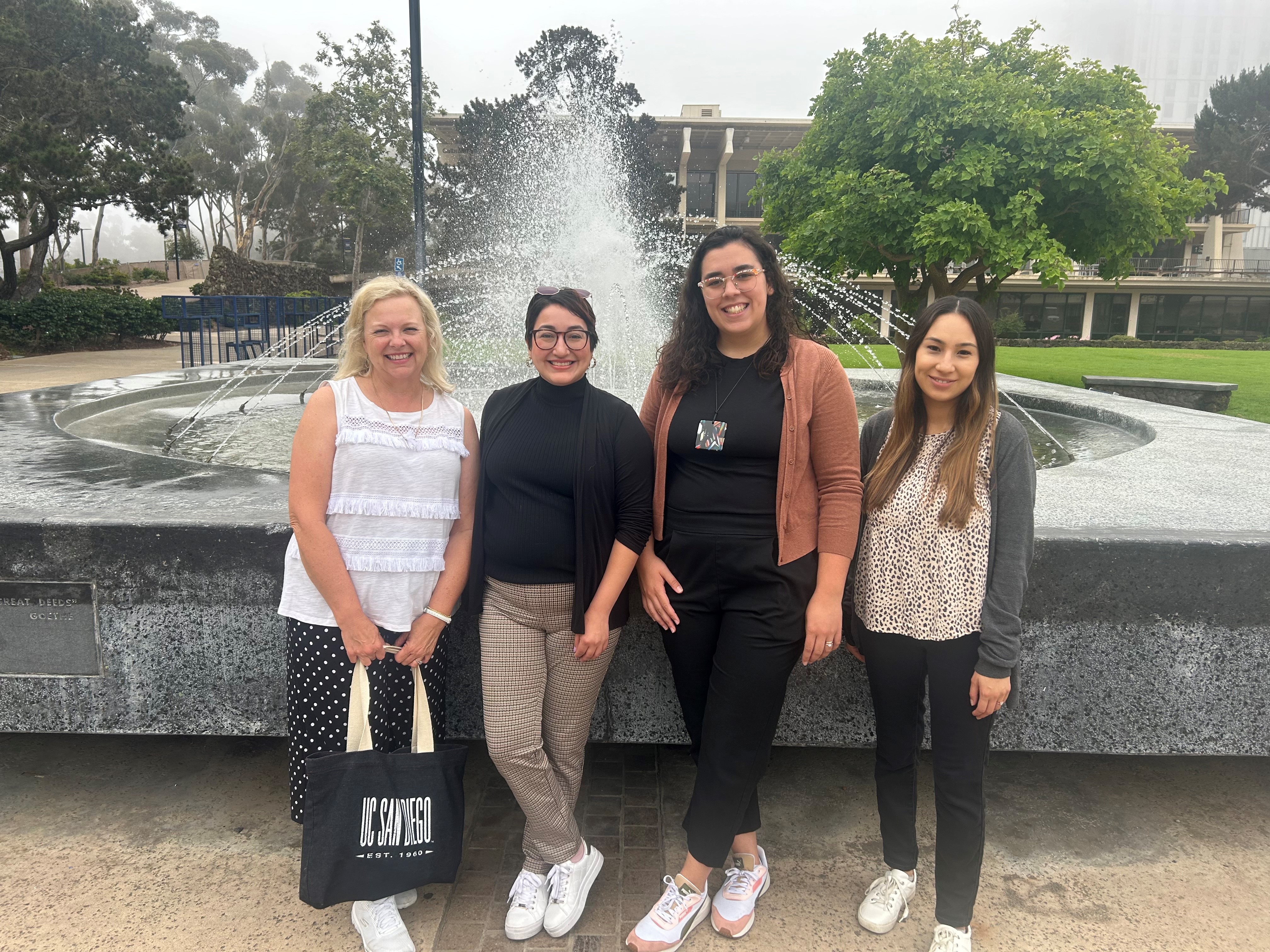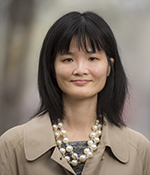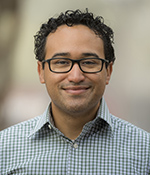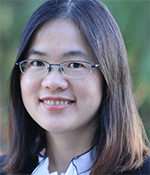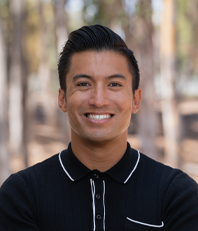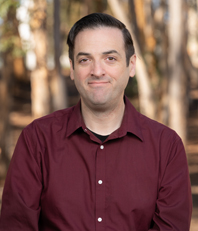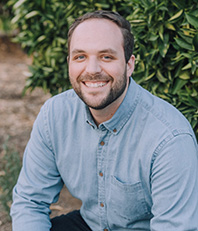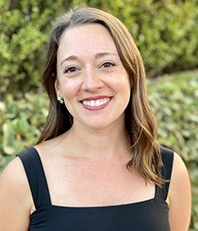| Year |
Post-Doctoral Resident // First Job Post-Training Year |
| 2003-04 |
- Rina Schul, Ph.D. // Staff Psychologist, UCSD
|
| 2004-05 |
- Christina Lambert, Ph.D. // Staff Psychologist, UCSD
- Natalie Rice-Thorp, Ph.D. // Staff Psychologist, UCSD
|
| 2005-06 |
- Danny Singley, Ph.D. // Private Practice
|
| 2006-07 |
- Jim Harbin, Ph.D. // Staff Psychologist, UNC-Charlotte
- Nima Patel, Ph.D. // Staff Psychologist, Univ. of Illinois
|
| 2007-08 |
- Annie Ahn, Ph.D. // Staff Psychologist, CSU Fullerton
|
| 2008-09 |
- Jacinta Jimenez, Psy.D. // Staff Psychologist, UCLA
|
| 2009-10 |
- Lauren Woolley, Ph.D. // Staff Psychologist, USD
|
| 2010-11 |
- Autumn Backhaus, Ph.D. // Psychologist, San Diego VA
- Jose Montes, Ph.D. // Staff Psychologist, CSU Northridge
- Kate Sirridge, Ph.D. // Staff Psychologist, Iowa State University
|
| 2011-12 |
- Jenss Chang, Ph.D. // Asst Professor, Azuza Pacific University
- Hoku Conklin, Ph.D. // Staff Psychologist, BYU
- Mark Jesinoski, Ph.D. // Staff Psychologist, CMH
- Amy La, Ph.D. // Staff Psychologist, UC Irvine
- Monique Mendoza Crandal, Ph.D. // Staff Psychologist, UCSD
- Jeffrey Poizner, Psy.D. // Psychologist, San Diego VA
|
| 2012-13 |
- Doriane Besson, Ph.D. // Staff Psychologist, UC San Diego
- Brittany Chidley, Psy.D. // Faculty & Private Practice, San Diego
- Lauren Feiner, Psy.D. // Private Practice
- Lisa Finlay, Ph.D. // Psychologist, Long Beach VA
- Stephanie Salo, Psy.D. // Staff Psychologist, UC San Diego
- Daniel Zamir, Psy.D. // Staff Psychologist, UC Santa Barbara
|
| 2013-14 |
- Susannah Flaherty, Psy.D. // Psychologist, Bentley Univ and Rasi Associates
- Koko Nishi, Psy.D. // Staff Psychologist, SDSU
- Kevin Ramotar, Psy.D. // Staff Psychologist, UC San Diego
- Marybeth Rigali-Oiler, Ph.D. // Staff Psychologist, USD
- Krystle Rivera, Psy.D. // Licensure, Texas
- Sherry Shaw, Psy.D. // Staff Psychologist, UC San Diego
|
| 2014-15 |
- Jonathan Dator, Ph.D. // Staff Psychologist, Providence College
- Robert Lim, Ph.D. // Psychologist, Kaiser
- Susana Martinez, Psy.D. // Staff Psychologist, UT San Antonio
- Pilar Meany, Psy.D. // Private Practice
- Meg Stein, Psy.D. // Private Practice
- Ryan Stevenson, Ph.D. // VA San Diego
|
| 2015-16 |
- Ginger Villareal Armas, Ph.D. // Post-Doctoral Resident, UC San Diego
- Leah Heng Tappero, Ph.D. // Staff Psychologist, UC San Diego
- Saliha Kozan, Ph.D. // Psychologist, Turkey
- Roberto Luna, Psy.D. // Post-Doctoral Resident, UC San Diego
- Katie Spaventa-Vancil, Ph.D. // VA San Diego
- Jasmine Tilghman, Ph.D. // Staff Psychologist, UC Irvine
|
| 2016-17 |
- Ginger Villareal Armas, Ph.D. // Staff Psychologist, Cornell
- Shannon Franklin, Psy.D. // Staff Psychologist, USD
- Roberto Luna, Psy.D. // Staff Psychologist, UC San Diego
- Ronald Ma, Ph.D. // Staff Psychologist, Univ of Washington
- Niyatee Sukumaran, Ph.D. // Staff Psychologist, UC San Diego
- Sochanvimean Vannavuth, Ph.D. // Staff Psychologist, Univ of Kansas
|
| 2017-18 |
- Pooja Amatya, Psy.D. // Licensed Psychologist
- Morgan Anderson, Psy.D. // Private Practice
- Sheeva Assar, Psy.D. // Staff Psychologist, UC Irvine
- Parissa Nili, Psy.D. // Staff Psychologist, USC
- Sachiko Sweetwood, Ph.D. // Licensed Psychologist
- Matthew Alex Thibeault, Ph.D. // Staff Psychologist, Palomar College
|
| 2018-19 |
- Kevin Burchby, Psy.D. // Private Practice
- Nicole Chow, Psy.D. // Staff Psychologist, UC Irvine
- Shawndeeia Drinkard, Ph.D. // Private Practice
- Wesley Kane, Psy.D., BSN // Private Practice
- Tahirih Moffett, Psy.D. // Private Practice
- Ming-Che Tu, Ph.D. // Staff Psychologist, USC
|
| 2019-20 |
- Miriam Adrianowicz, Psy.D. // Private Practice
- Julie Badaracco, Psy.D. // Private Practice
- Sophie Bryan, Psy.D. // Private Practice
- Kristen Lipari, Psy.D. // Private Practice
- Andy Nguyen, Psy.D. // Private Practice
- Emily Roberts-Parker, Ph.D. // Staff Psychologist, SDSU
|
| 2020-21 |
- Danielle Hanley, Psy.D. // Private Practice
- Tyler Hatchel, Ph.D. // Staff Psychologist, UCSD
- Carly Knauf, Psy.D. // Private Practice
- Michael McGlenn, Psy.D. // Staff Psychologist, UCSD
- Kristina Mendez, Ph.D. // Private Practice
- Ben Metta Penhas, Psy.D. // Private Practice & Staff Psychologist, UCSD
|
| 2021-22 |
- Alyssa Hufana, Ph.D. // Staff Psychologist, Cal State Long Beach
- Bryan Balvaneda, Ph.D. // Staff Psychologist, UCSD
- David Diaz, Ph.D. // Staff Psychologist, UCSD
- Kaitlyn Saulman, Psy.D. // Staff Psychologist Cal State Long Beach and UCSD
- Nava Sedaghat, Psy.D. // Private Practice and Staff Psychologist, UCSD
- Noreen Marsland, Psy.D. // Private Practice
|
| 2022-23 |
- Bridget Aiello, Psy.D. // Private Practice
- Mariel Ruiz Stasiuk, Psy.D. // Private Practice
- Sara Heinemann, Psy.D. // Staff Psychologist, Cal State University San Marcos
|
| 2023-24 |
- Agnieskza Pollard, Ph.D. // Private Practice
- Amy Nannan, Psy.D. // Staff Psychologist, UCSD
- Donna Phonsane, Ph.D. // California License
- Cassandra Lawson, Psy.D. // California License
- Roselee Ledesma, Ph.D. // Staff Psychologist, UCSD
- Nile Brandt, Ph.D. // Staff Psychologist, Scripps Research Institute
|
| 2024-25 |
- Laura Bermudez, Psy.D
- Luiza Martins, Ph.D. // Staff Psychologist, USD
- Nicole Matei, Psy.D. // Private Practice
|
